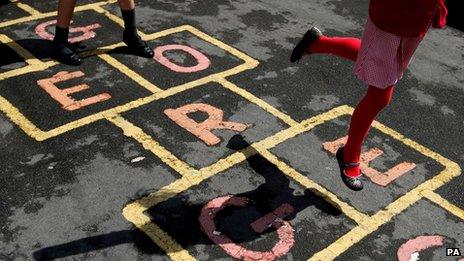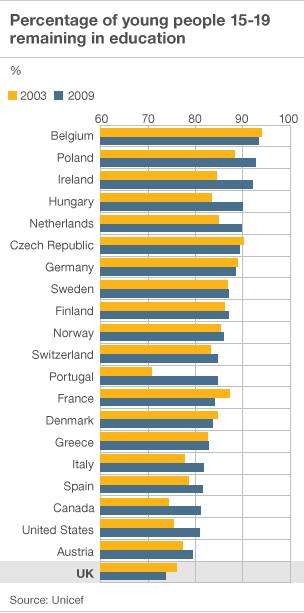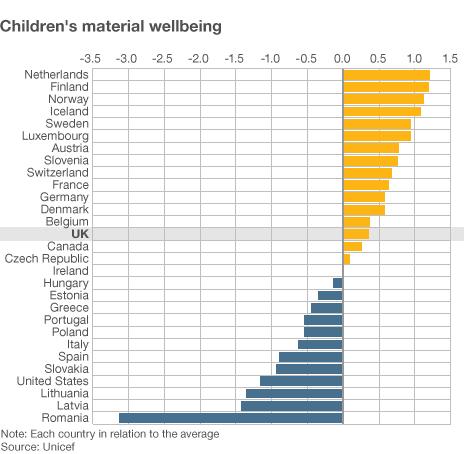UK rises up Unicef child well-being ranking
- Published

The UK has moved up to 16th place in the table after being placed at the bottom of the ranking in 2007
The well-being of British children has improved in a number of areas in recent years but they still lag behind many of their European neighbours, Unicef says.
The charity ranks the UK 16th out of 29 developed countries, up from 21st - and last - place in a 2007 table.
Action on smoking, drinking and obesity has seen success but further education and unemployment remain concerns.
The Netherlands retains it place top in the list, based on data from 2009-2010, followed by Norway and Iceland.
The other countries at the top of the list were Finland, Sweden, Germany, Luxembourg, Switzerland, Belgium, and Ireland.
Romania remained at the foot of the table, behind Latvia, Lithuania and the United States.
The United Nations charity considered five areas, including children's material well-being, which looked at how they were affected by poverty and material deprivation.
It also assessed statistics on health and safety, education, behaviour and housing conditions.
Unicef's report suggests there was an overall general improvement in UK children's experiences, compared with its previous assessment, which considered information from 2001-3.
The UK's seen a fall in young people who are overweight, from more than 15% to a little over 10%, and children reported an increase in their life satisfaction.
But despite the drop in drinking levels, the UK also still had one the highest alcohol abuse rates by young people between the age of 11 and 15, which is said to affect about 20%.
The report also identifies figures showing the UK as having the lowest rates of further education in the developed world, with fewer than 75% of young people studying, compared with more than 80% in other populous developed countries.

Unicef suggests this "may be the result of an emphasis on academic qualifications combined with a diverse system of vocational qualifications".
But it is also found that in the period assessed, the UK had the highest rates of young people not in education, employment, or training, affecting 10% of 15 to 19-year-olds.
The UK's ranking also took account of figures showing rising teenage UK pregnancy rates, although more recent figures suggest these are now falling.
The latest report, unlike those from 2007, does not take account of children's own assessment of their lives, when it came to working out overall well-being.
However, it notes that even in countries at the bottom of the ranking, more than 75% placed themselves above the mid-point of life satisfaction.
And in this particular category, the UK has moved up from 16th to 11th place, one of the biggest increases among rich countries, with more than 85% of British children saying they have a high level of overall life satisfaction.
A lack of available data means that a number of nations, including Australia, Japan, Mexico, New Zealand, South Korea, and Turkey, were not included in the study.
'Vital reforms'
Unicef UK warned that the improvement seen under the Labour government risks being reversed by coalition cuts.
It added that "since 2010 the downgrading of youth policy and cuts to local government services are having a profound negative effect".
Anita Tiessen, deputy executive director of Unicef UK, said: "There is no doubt that the situation for children and young people has deteriorated in the last three years, with the government making policy choices that risk setting children back in their most crucial stages of development."
The Children's Society said it was also concerned about the effects of the cuts as well as the low well-being among teenagers identified in the report.
"It is far too easy to assume that teenagers aren't as vulnerable as younger children or don't need as much support," said Lily Caprani, director of communications and policy at the charity.
But a spokesman for the government said: "The data used in this report, which all relates to 2010 and earlier, underlines the urgent need for the government's reforms. We are determined to improve opportunities for children in this country."
He highlighted the coalition's early education programme and investment in traineeships and apprenticeships.
Education Minister David Laws added: "This report shows that Labour's approach of simply pouring money into the system without meaningful reform has not been enough.
"The coalition government is making the vital reforms in childcare, schools and further education needed to improve children's lives and increase their opportunities."

- Published1 November 2012
- Published20 February 2013
- Published4 January 2012
- Published14 September 2011